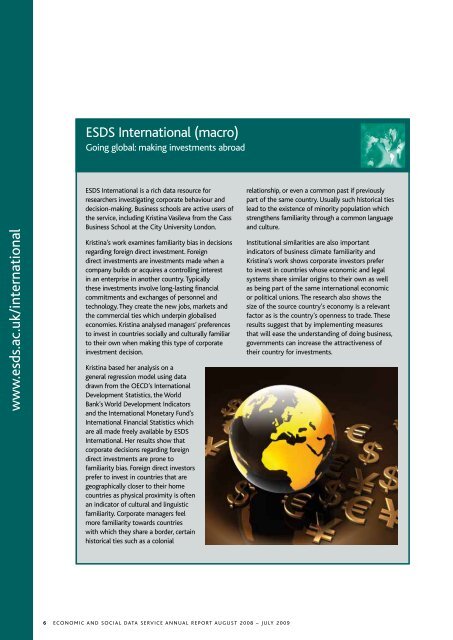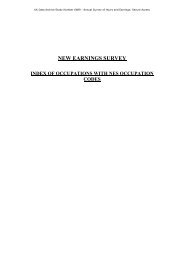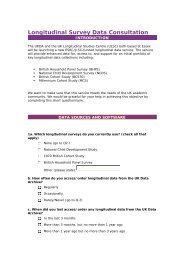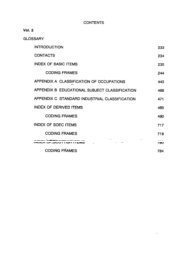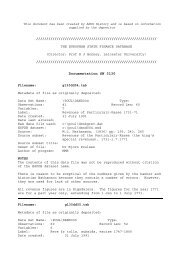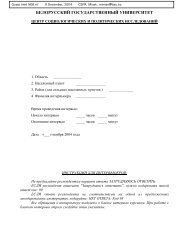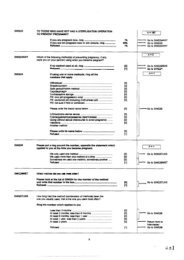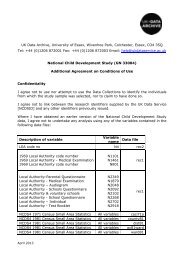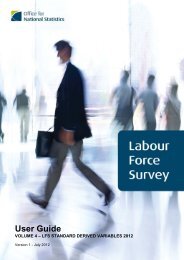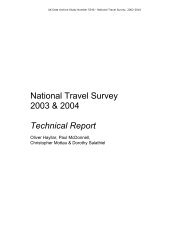ESDS Annual Report, 2008-2009
ESDS Annual Report, 2008-2009
ESDS Annual Report, 2008-2009
Create successful ePaper yourself
Turn your PDF publications into a flip-book with our unique Google optimized e-Paper software.
www.esds.ac.uk/international<br />
<strong>ESDS</strong> International (macro)<br />
Going global: making investments abroad<br />
<strong>ESDS</strong> International is a rich data resource for<br />
researchers investigating corporate behaviour and<br />
decision-making. Business schools are active users of<br />
the service, including Kristina Vasileva from the Cass<br />
Business School at the City University London.<br />
Kristina’s work examines familiarity bias in decisions<br />
regarding foreign direct investment. Foreign<br />
direct investments are investments made when a<br />
company builds or acquires a controlling interest<br />
in an enterprise in another country. Typically<br />
these investments involve long-lasting financial<br />
commitments and exchanges of personnel and<br />
technology. They create the new jobs, markets and<br />
the commercial ties which underpin globalised<br />
economies. Kristina analysed managers’ preferences<br />
to invest in countries socially and culturally familiar<br />
to their own when making this type of corporate<br />
investment decision.<br />
Kristina based her analysis on a<br />
general regression model using data<br />
drawn from the OECD’s International<br />
Development Statistics, the World<br />
Bank’s World Development Indicators<br />
and the International Monetary Fund’s<br />
International Financial Statistics which<br />
are all made freely available by <strong>ESDS</strong><br />
International. Her results show that<br />
corporate decisions regarding foreign<br />
direct investments are prone to<br />
familiarity bias. Foreign direct investors<br />
prefer to invest in countries that are<br />
geographically closer to their home<br />
countries as physical proximity is often<br />
an indicator of cultural and linguistic<br />
familiarity. Corporate managers feel<br />
more familiarity towards countries<br />
with which they share a border, certain<br />
historical ties such as a colonial<br />
6 E C O N O M I C A N D S O C I A L DATA S E RV I C E A N N UA L R E P O RT AU G U S T 2 0 0 8 – J U LY 2 0 0 9<br />
relationship, or even a common past if previously<br />
part of the same country. Usually such historical ties<br />
lead to the existence of minority population which<br />
strengthens familiarity through a common language<br />
and culture.<br />
Institutional similarities are also important<br />
indicators of business climate familiarity and<br />
Kristina’s work shows corporate investors prefer<br />
to invest in countries whose economic and legal<br />
systems share similar origins to their own as well<br />
as being part of the same international economic<br />
or political unions. The research also shows the<br />
size of the source country’s economy is a relevant<br />
factor as is the country’s openness to trade. These<br />
results suggest that by implementing measures<br />
that will ease the understanding of doing business,<br />
governments can increase the attractiveness of<br />
their country for investments.


